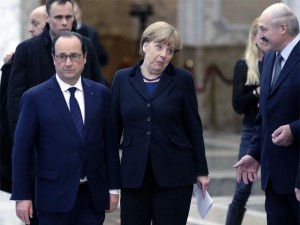The Belarusan National Platform of the EaP CSF issued a statement in connection with the wave of searches in the editorial offices of the Belarusan media and the detention of journalists.
Intellectual thought as a result of the regime (Photo)

Do we really live in the context where it is not enough for thinking to exist and work — it has yet to announce itself as well?
This year the second anthology of national thinking since the proclamation of independent Belarusan state was launched. This event, just as the Week of Belarusan Thinking, which took place from 19th to 25th of September is a kind of stop for the national thought when one can look back, sum up the accumulated knowledge and think where to go next. It is the last question that became the center of attention for intellectuals during the final lecture of the Week “Belarusan thinking: quo vadis?”

Left — right: Ihar Babkou, Tatiana Shchyttsova, Mikhail Bayaryn, Pavel Barkouski, and Tatsiana Vadalazhskaya
Tatiana Shchyttsova, EHU philosophy professor started with comparing two anthologies.
“The main difference is that the second project had no gap between the selection of the texts offered in the book and rhetoric of the Belarusan thinking that accompanied the draft of the publication.”
Tatiana Shchyttsova called the specifics of the new rhetoric “inclusive” meaning that now Belarusan thinking appears to be multipolar, multidimensional, and still having a sore point in language issue. There is a certain historical experience in the distance between the first and the second anthology that resulted in the Week of Belarusan Thinking.

Ihar Babkou and Tatiana Shchyttsova
“I have the impression that although there is no gap between the two books indeed there is a certain invisible connection between what was happening, like a beginning and an end,” said Ihar Babkou, the philosopher, poet and writer. “The act of thinking is not only in the books themselves but also around them, and in that gap, the tension that we find between the two editions.”
According to Ihar Babkou, an “internal harmonization of space” took place: while the first anthology had an obvious goal to connect the academic discourse with the discourse of free-form thinking, the second one is more harmonious:
“It seems to me that the beginning of the Belarusan thinking was associated with space clearance. In this context, Valiantsin Akudovich’s text “Paris Destruction” is highly symptomatic. We talked about the dictatorship of the center and peripheralization of thinking, and we just needed to push the academic forms aside a bit.”
“We live in such a socio-political and cultural context where it is not enough for thinking to exist and work — it has to announce itself as well,” says Tatiana Shchyttsova.
Maybe this is due to the “youth” of our thinking, but the most important is the way in which it is developing.

Pavel Barkouski (in the center)
“The difference between the two anthologies is not as big as it could be,” philosopher Pavel Barkouski evaluates the domestic intellectual thinking results. “Anyway, the second anthology was prepared under the influence of the first one. What we got in the end was a compromise between the editors.”
Pavel Barkouski singles out several trends in the development of the Belarusan thinking, and the first is that we no longer need to persuade others so passionately that the Belarusan thinking exists. The second one is that thinking has expanded its borders.
“It's really found itself, “cleared the space” and has acquired its content, both in terms of questions of the post-colonial state, nation formation, as well as metaphysical questions,” Pavel Barkouski sums up.

Others
-
Statement of the Belarusan EaP CSF National Platform on solidarity with the civil society of Armenia
The Belarusan National Platform of the Eastern Partnership Civil Society Forum issued a statement on solidarity with the civil society of Armenia.
-
Statement of the BNP in connection with the criminal prosecution of the leaders of the Belarusan independent trade unions
The Belarusan National Platform of the Eastern Partnership Civil Society Forum issued a statement in connection with the criminal prosecution of the leaders of the Belarusan independent trade unions.
-
Final event of project CHOICE — Paving the way to European Year of Cultural Heritage 2018
The final event of the two-year EU funded project CHOICE — Cultural Heritage: Opportunity for Improving Civic Engagement was held on June 6, 2017 at the Committee of the Regions, in Brussels.
-
Heritage is a verb. The results of the CHOICE project were summarized in Minsk (Photos and video)
Does Belarus need a “Public Ministry of Culture” and “Ašmiany Charter” to deal with the historical and cultural sites?








Comments
From farewell to a new Eastern policy and towards a new development
Poland and Germany were both initiators and drivers of a New Eastern policy linked to the Eastern neighborhood and Russia/Soviet Union.